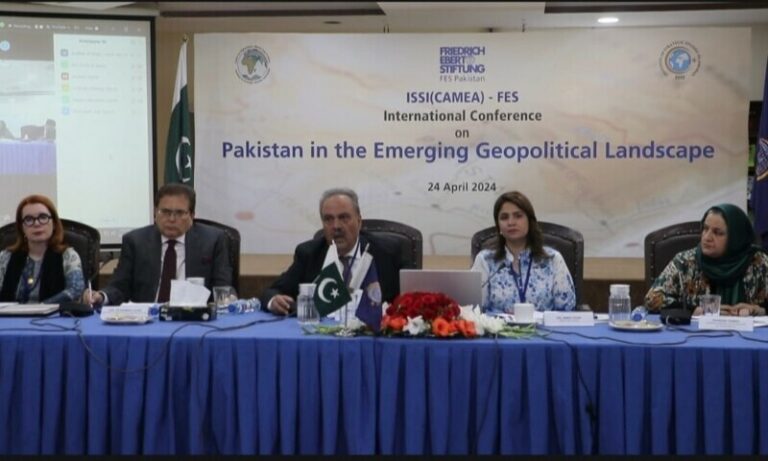Pakistan’s special representative for Afghanistan, Ambassador Asif Durrani, said on Wednesday that in terms of bloodshed and financial drains, Pakistan has suffered more because of its domestic situation than from its three wars with India.
Ambassador Durrani was speaking at the one-day international conference ‘Pakistan in the new geopolitical landscape’ organized by the Islamabad Institute for Strategic Studies (ISSI) and Germany’s Friedrich Ebert Stiftung (FES).
Durrani said more than 80,000 Pakistanis had died in the war on terror over the past two decades, and the country was still counting the number of dead and injured.
“After the withdrawal of NATO troops, it was hoped that peace in Afghanistan would bring peace to the region. However, such hopes did not last long.”
He said attacks by Tehreek-e-Taliban Pakistan (TTP) in Pakistan’s border areas had increased by 65% and suicide bombings had increased by 500%.
“The TTP’s intensification of attacks against Pakistan while exploiting Afghan soil is of serious concern to Pakistan. Another worrying aspect is the participation of Afghan nationals in these attacks,” he claimed. did.
Explaining how Pakistan suffered due to developments in Afghanistan, he said that Pakistan has suffered geopolitically since the Soviet Union invaded its neighboring country.
“The post-9/11 world order has had a negative impact on Pakistan. Apart from the loss of lives of 80,000 citizens, including 8,000 law enforcement personnel, the economic opportunity cost of the country has been It is estimated at $150 billion,” Durrani said.
He pointed out that while Pakistan is designated as a non-NATO ally, the imposition of travel advisories by NATO member countries has had a negative impact on Pakistan, making it more expensive to do business with Pakistan and increasing insurance premiums. did. As a result, Pakistan’s exports remained stagnant.
“Second, Afghanistan has been a permanent element of Pakistan’s regional paradigm for over 40 years.”
Regarding Pakistan’s future prospects in the regional context, Durrani said, “Although our eastern neighbors are likely to continue their anti-Pakistan pursuits, our western borders represent an avoidable irritant in the short to medium term.” Stated.
However, he pointed out that with skillful diplomacy, Pakistan can overcome difficulties with Afghanistan, including the TTP issue.
Ambassador Durrani said China and Iran will maintain friendly relations and provide a sound basis for a lasting partnership in security and economic areas.
“The budding romance between India and the US, the flux in Middle East politics and Israeli atrocities against the Palestinians will pose formidable challenges for Pakistan and its diplomacy,” he said.
Speakers at the session provided a comprehensive analysis of Afghanistan’s evolving situation and highlighted the long-term impact of militarized education investments.
They emphasized the devastating effects of divisive politics, which have weakened regional economies and polarized societies.
Speakers also pointed to the role of ethnic discord in Afghanistan, with ethnic fault lines contributing to the complex situation on the ground. In particular, speakers highlighted the difficult situation of women’s education in Afghanistan and highlighted the isolation and humanitarian crisis facing the Afghan people.
They expressed optimism about Afghanistan’s potential, especially its historic role as a link between East and West.
Speakers recommended a proactive approach and comprehensive strategy to address Afghanistan’s problems.
They will focus on regional dialogue and cooperation, border and refugee management, leveraging partnerships and engagement with local populations, building Afghanistan’s economic capacity through connectivity, trade and transport routes, and adopting a broader perspective on Afghan issues. proposed to do so.
The working session on “Uncovering Afghanistan’s Changing Landscape” was moderated by Amina Khan, Director of the Afghanistan, Middle East and Africa Center.
The speakers concluded by recognizing the need for a nuanced understanding of the situation on the ground and the potential consequences of different policy interventions.
The second working session titled “From Dependency to Diversity: The Evolution of the Middle East” was moderated by Dr. Shabana Fayyaz, Chair and Associate Professor, Directorate of Defense and Strategic Studies, Quaid-e-Azam University, Islamabad. I did.
The speakers emphasized that the current geopolitical situation in the Middle East is characterized by numerous dynamic changes and evolving alliances.
Amid efforts to diversify the economy in the region, concerns over security arrangements have increased, especially in light of the United States’ strategic pivot to the Asia-Pacific region.
This change has prompted a reassessment of power relations in the region, as traditional Western influence faces challenges from the rise of China.

